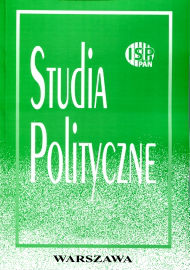Przesłanki wyboru i funkcjonowanie reżimów semiprezydenckich w Serbii i Chorwacji w latach dziewięćdziesiątych
Premises for selection and operation of semi-presidential regimes in Serbia and Croatia in the 90s
Author(s): Dominika Mikucka-WójtowiczSubject(s): Politics / Political Sciences
Published by: Instytut Studiów Politycznych PAN
Summary/Abstract: Premises for selection and operation of semi-presidential regimes in Serbia and Croatia in the 90s and their impact on the course of the democratisation process The article aims at answering the question as to whether introducing semi-presidential regimes in Serbia and Croatia during the democratic transformation had a large impact on the course, or, in fact, the freezing of this process. In the theoretical part of the paper, assumptions regarding the operation of semi-presidential regimes have been analysed, with particular focus on disputes in the literature on the subject regarding the defi nition of such type of systems; the immanent features of the latter are also indicated. Not all political scientists acknowledge semi-presidential systems as a distinct type of political regime and, even if they do, they disagree as to whether a given system has come into being as a result of a combination, a synthesis, of elements of parliamentary and presidential systems (as postulated by Krouwel) or if, in fact, it alternates them (as suggested by M. Duverger and A. Lijphart) in the sense that the phases of the system’s operating as a presidential one alternate with those where it operates as a presidential regime. The issue of the impact of specific political regimes on the process of democratisation is also referred to. Most scholars who specialise in transition processes claim that semi-presidential and presidential systems make the process of democratic transformation more difficult and slow down its progress. They thus support introducing a parliamentary system during in the period of transformation. The author attempts to prove that this relationship is not that unambiguous. The analytical part of the paper is devoted to the operation of semi-presidential systems in Serbia and Croatia in the 90s, that is, in the period when Presidents Slobodan Miloševic and Milan Milutinovic ruled in Serbia and Franjo Tudźman in Croatia. Pointing to contradictions between constitutional solutions and the actual practice of governance by the three presidents constitutes an important part of the considerations. In the author’s opinion, what was decisive in halting the democratisation process under the rule of Tudźman and Miloševic was their personalities, as well as the specific circumstances, which were conducive to the growth of authoritarian tendencies, rather than specific solutions, in terms of social and political systems. It was not the presidents’ use of their constitutional prerogatives which was a problem, but their exceeding of them, often even drastically.
Journal: Studia Polityczne
- Issue Year: 2010
- Issue No: 26
- Page Range: 29-62
- Page Count: 34
- Language: Polish

